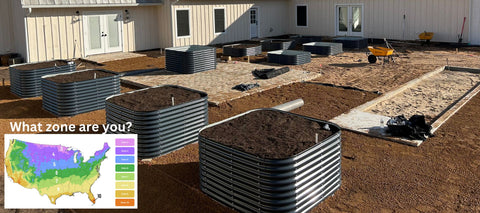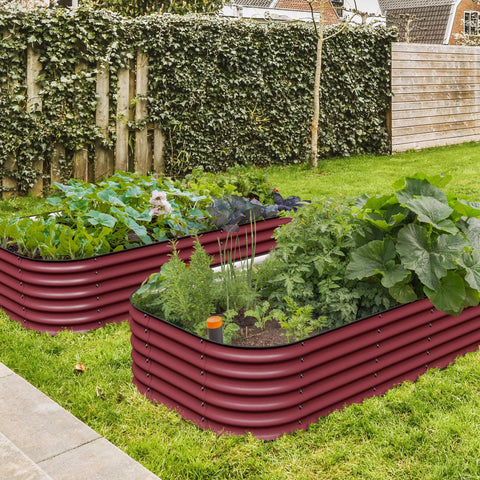Knowledge from Olle Garden Bed: White Bugs In The Soil And How To Deal With The Soil
Plant cultivation may be a challenging task. Although some plants are easier to maintain than others, all plants have one thing in common: they may attract pests. he following content also has some reference value for raised garden beds.
White bugs in the soil and how to deal with the soil
Small white worms in garden soil may be parasitic nematodes. This kind of parasite is very harmful and can attack roots, leaves and flowers. Make the following adjustments to the compost to remove these white worms.
If they are legless mollusks and their bodies are not segmented like white tubes, they are plant parasitic nematodes.

White insects in the soil: how to get rid of them
The number of basin worms can be reduced by changing the ph balance of the compost pile to make it acidic and alkaline. It is also beneficial to dry compost and reduce moisture content. In essence, ph value represents the "power of hydrogen", which determines the acidity. When too much organic matter is introduced for decomposition or people add too much high-acidity food, compost will become too acidic. Some of these items are sugar, citrus, dairy products and processed foods.
So, if any, what should you do if you find white worms in the compost?
- Lime helps compost reduce acidity. Acidity can be neutralized by adding calcium carbonate materials (such as crushed eggshells or agricultural lime).
- In addition, wood ash is beneficial to lime and can reduce acidity. If you have any remaining ashes, please try these. It will also enrich your compost with beneficial potassium.
- It can improve the ventilation of compost pile to accelerate the decomposition of organic matter. If the compost is too wet, aeration will also help to dry it.
- The optimum moisture range is between 40% and 60%. For a period of time, try to reduce the water content to a maximum of 40%.
- Reduce the proportion of moisture and acidic organic matter by mixing dry materials such as straw or cardboard fragments.
Why are there white bugs in the soil?
If you find any infestation or disease in the soil around the plant, or the problem may worsen, it is essential to take immediate action.
If there are white insects in the soil of its neighbor, even the new plants without problems may suddenly turn in another direction.
Before you know it, your plants will be affected. Tiny white insect infestation may be caused by various factors, so plant care personnel must understand the possibility of higher.
These are the main causes of white insects in the soil.
Soil ph
As a gardener, you may know that the ph value of the soil will affect what can grow there and the health of specific plants.
Do you know that a specific ph range can also cause the appearance of white worms?
Adverse ph values will inhibit new growth and may damage plants. After that, you will have a perfect home for white bugs, which will breed rapidly.
Rain
It is important to remember that rain is not always your friend when considering outdoor plants.
Yes, your plants need water, which is beneficial when the light rain provides them with the water they need.
However, when the rain is more difficult, it will occasionally wash away the important nutrients of the soil, because you may have too many good things. Like white insects, pests have ideal environment for direct propagation. This is because they need a humid environment to thrive. Therefore, these insects are more likely to be found in damped soil. In particular, white insects like moist soil. Once they are there, they will reproduce at an amazing speed, as we have explained. Once this happens, recovery can be very challenging.
Moisture content
If you plant indoor plants, you will know the need to maintain an appropriate humidity level. Different plants have different requirements; Some people like to be very dry, while others need a lot of water.
However, when plants are continuously exposed to high humidity levels, problems begin to appear.
If the factory is not kept clean and sanitary, the situation will become worse. By absorbing all these fluids, plants become more vulnerable to pests and other diseases.
Although it is harmful to plants, it provides an ideal habitat for the small white bug we are trying to eradicate.
Fresh soil
Naturally decaying organic matter will eventually enter your soil. This category includes dead insects, aged fruits, fallen leaves and other things.
Although a small amount of decomposed organic matter is beneficial and provides food for these earthworms, excessive amount will cause problems.
If you ignore the problem and it gets out of control, you will soon start to find the white bug.
In addition, this atmosphere is very suitable for these creatures to start breeding. Therefore, the number of white insects will increase rapidly.

Can I stop white worms from living in my soil?
In order to avoid having to treat white bug infestation, it is wise to try and prevent them first.
However, even after treating infection, you can use the following suggestions to avoid further problems. You must pay close attention to the water content of the soil.
Avoid giving too much water to plants and make sure the soil is dry before adding more water.
Although each plant is unique and some plants may need to be watered more regularly than others, tools such as soil hygrometers may help.
In addition, it is safer to use a spray instead of just pouring water underground, and it can ensure that the earth is not too wet. Exposure to moist soil will attract fungi, mosquitoes and gnats.
If your plants need to be watered more frequently, covering the soil is a wise choice. Sand, pebbles, or gravel are just a few options you can use. They all look great. Experience tells us that it is important to ensure the ideal ph balance of soil. If necessary, you can change this setting and block white bugs by adding specific items.
In addition to using lime or phosphorus, wood ash can also be used effectively.
This is also useful if you want to prevent intrusion, because the population will decline after using these things.
Last but not least, check new plants regularly for signs of infestation. Do not leave the plant outdoors and bring it back indoors without first checking it.
How long should this process last?
Treatment should not take a long time to start to work. However, spraying pesticides on plants will soon eliminate pests.
To speed up the operation, you can also manually remove any obvious white worms.
This is particularly useful for less important intrusions.
Of course, it may take longer to treat more serious problems. In extreme cases, you may even have to admit failure and replace the whole soil.
Are white insects good for the soil?
If white insects are found in compost, it is not necessarily a bad thing.
Their presence will not harm the composting process.
Even so, this may indicate that compost is not friendly to more beneficial worms (such as the red wiggler).
White worms themselves are excellent compost. They turn organic waste into useful soil supplements, like earthworms or red wigglers. Therefore, they contribute to the overall composting process.
When the environment is ideal, basin insects can reproduce rapidly, leading to a large population.
Earthworm dung contains tiny white worms.
If you find white worms in earthworm dung, the environment may be excessively acidic. You should usually avoid this situation.
Red worms, known as red wigglers, are said to be better than white worms in composting, especially if you have a worm farm.
Red worm has a unique digestive system, which is used to produce earthworms from food residues and other organic materials, a nutritious compost.
Red worms are best used in earthworm composting (composting with worms).
If white worms are more common, red worms are unlikely to appear in compost.
Red insects are sensitive to ph value, which is crucial for their survival and growth. All worms have delicate skin, and ph will affect them.
The lower ph value and more acidic conditions drive away the red wigglers and hinder the composting process, as indicated by the white worms in the compost. This may also mean that your compost is too wet.
How does the pot worm work?
These thread-like organisms may be the larvae of basidium or fungus Simulium.
They will cause problems for your plants, because they will attack the roots and remove all soil organic substances that provide nutrients.
What to expect If you find these tiny creatures on your land, there is no need to panic. You can choose to get rid of plants while protecting them.
If any type of soil you see is healthy, there will be some worms. Some worms, such as earthworms, are thought to be good for your soil because they are decomposers.
They decompose organic matter in the soil into plant nutrients. There are many other worm species, including the pot worm, which is often confused with the young red worm (an earthworm species).
You may be surprised to find that although these basin worms almost always exist, they may spread and turn an area into an intrusion.
It is best to solve this problem as soon as possible, because once they take root in the soil, their breeding speed will be very fast.
They will not harm your plants like fungus moth larvae, but in the worst case, they may cause root rot and withered leaves.
In addition, once established, they will prevent ordinary red creepers from establishing camps, thus preventing your plants from benefiting from these creatures.

What is the larva of the fungus Simulium?
Sometimes, the little white bug you see hidden in the soil of your favorite family plant is another matter.
They are young fungus Simulium. A kind of tiny flying insect called fungus borer is often found hovering around plants and soil.
In addition to being ugly, if these larvae are pests, they will also harm your plants. They will completely deplete the valuable organic matter in the soil and let your plants survive.
In addition, if the infection is not controlled, the root rot will definitely affect your plants. Fungal borer larvae are also a problem because they are persistent. If you have multiple plants adjacent to each other, they will spread.
The final idea about white insects in soil and how to treat soil
Composting can be difficult. You may encounter various problems when composting. Including strange events in the pile!
Since they naturally exist in compost, the whitepot worm itself is neither good nor harmless.
One way to get back on track is to reduce the ph value of compost.
However, mastering effective composting methods and avoiding problems will improve everyone's process - including worms!
If you find small white worms in the soil, they may be the larvae of pot worms or fungus Simulium.
These will deplete the underground organic matter and often leave enough for your plants, which will affect them.
Although they are easy to get rid of, you need to start to deal with this problem urgently and solve the potential problem in advance!
Happy insect-free gardening!
